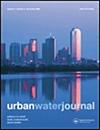The impact of stormwater management strategies on the flow regime of a peri-urban catchment facing urbanisation and climate change: a distributed modelling study in Lyon, France
IF 1.6
3区 环境科学与生态学
Q3 WATER RESOURCES
引用次数: 0
Abstract
ABSTRACT The relative impact of urbanisation (urban sprawl), climate change (rainfall and evapotranspiration) and stormwater disconnection strategies (implementation of green infrastructure (GI)) on a peri-urban stream in the western suburbs of Lyon, France, was investigated using a distributed, physically based model (J2000P). Results showed that ambitious catchment-scale implementation of GI has the potential to mitigate some hydrological effects of urbanisation, especially a drastic reduction of combined sewer overflows. However, GI did not have a large impact on the stream flow regime, especially in the context of climate change, as the stream is dominated by non-urban contributions. Spatially distributed models have the capacity to inform river managers about the extent of implementation of GI needed to achieve given management goals and highlight some limitations of disconnection strategies. Indeed, while GI improved the resilience of sewer networks to global change, it was not sufficient to compensate for the effects of climate change on streamflow.面对城市化和气候变化,雨水管理策略对城郊集水区流量的影响:法国里昂的一项分布式模型研究
采用分布式物理模型(J2000P)研究了城市化(城市蔓延)、气候变化(降雨和蒸散)和雨水中断策略(绿色基础设施(GI)的实施)对法国里昂西郊城郊河流的相对影响。结果表明,雄心勃勃的流域尺度GI实施有可能减轻城市化的一些水文影响,特别是大幅度减少联合下水道溢流。然而,地理指数对河流流量的影响并不大,特别是在气候变化的背景下,因为河流主要由非城市贡献。空间分布模型有能力告知河流管理者实现给定管理目标所需的地理标志实施程度,并强调断开策略的一些局限性。事实上,虽然地理指数提高了下水道网络对全球变化的适应能力,但它不足以弥补气候变化对水流的影响。
本文章由计算机程序翻译,如有差异,请以英文原文为准。
求助全文
约1分钟内获得全文
求助全文
来源期刊

Urban Water Journal
WATER RESOURCES-
CiteScore
4.40
自引率
11.10%
发文量
101
审稿时长
3 months
期刊介绍:
Urban Water Journal provides a forum for the research and professional communities dealing with water systems in the urban environment, directly contributing to the furtherance of sustainable development. Particular emphasis is placed on the analysis of interrelationships and interactions between the individual water systems, urban water bodies and the wider environment. The Journal encourages the adoption of an integrated approach, and system''s thinking to solve the numerous problems associated with sustainable urban water management.
Urban Water Journal focuses on the water-related infrastructure in the city: namely potable water supply, treatment and distribution; wastewater collection, treatment and management, and environmental return; storm drainage and urban flood management. Specific topics of interest include:
network design, optimisation, management, operation and rehabilitation;
novel treatment processes for water and wastewater, resource recovery, treatment plant design and optimisation as well as treatment plants as part of the integrated urban water system;
demand management and water efficiency, water recycling and source control;
stormwater management, urban flood risk quantification and management;
monitoring, utilisation and management of urban water bodies including groundwater;
water-sensitive planning and design (including analysis of interactions of the urban water cycle with city planning and green infrastructure);
resilience of the urban water system, long term scenarios to manage uncertainty, system stress testing;
data needs, smart metering and sensors, advanced data analytics for knowledge discovery, quantification and management of uncertainty, smart technologies for urban water systems;
decision-support and informatic tools;...
 求助内容:
求助内容: 应助结果提醒方式:
应助结果提醒方式:


